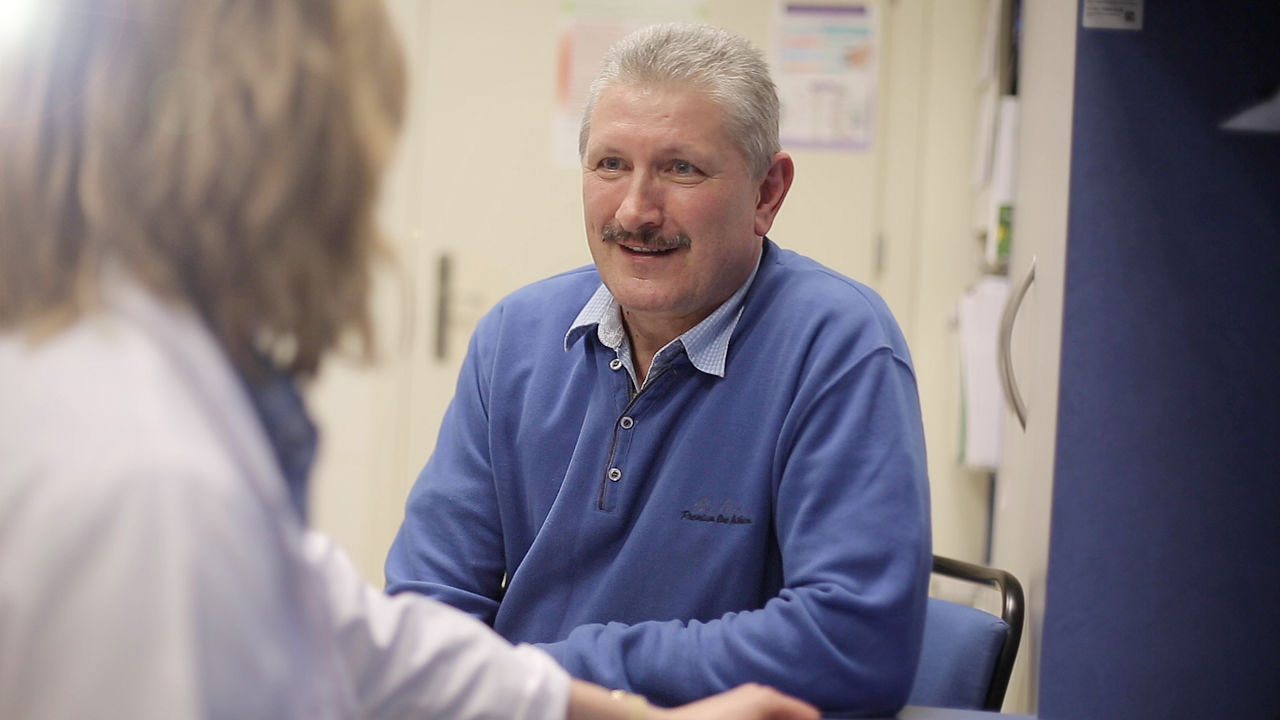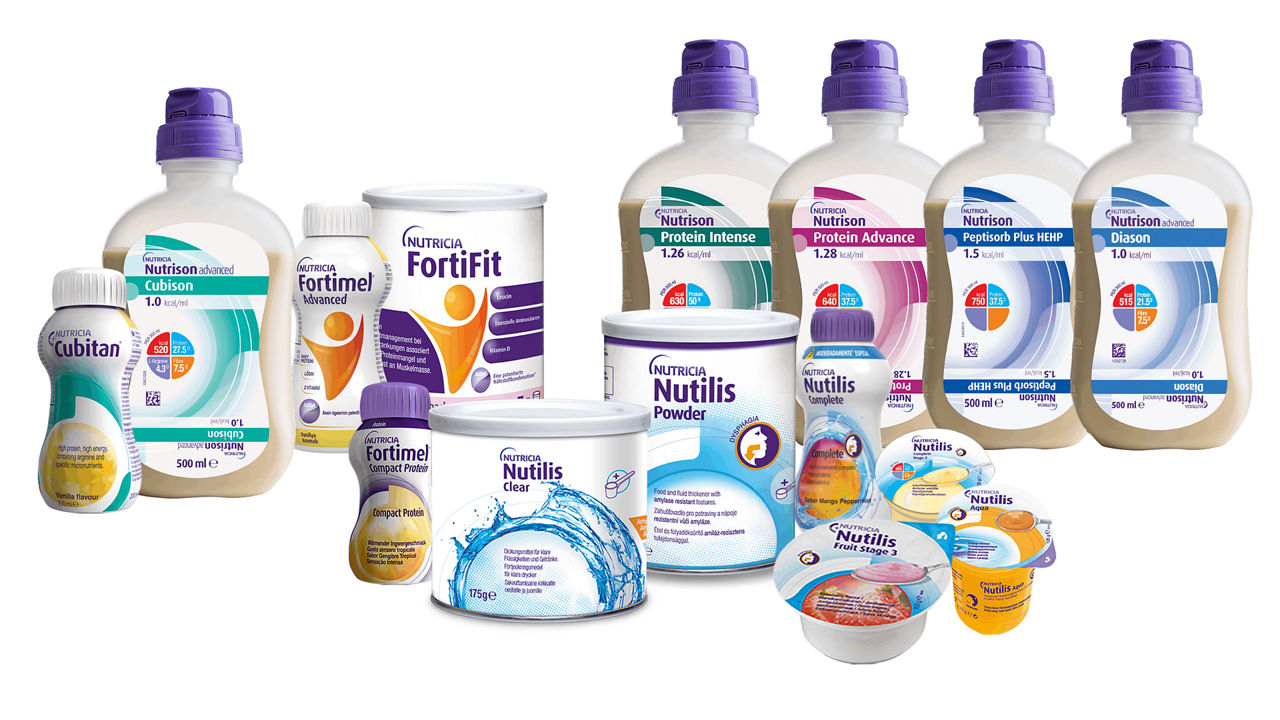Welcome to the healthcare professional pages of Stroke & Dysphagia. Here you’ll get more in-depth information on this health area, including feature articles, links to clinical guidelines as well as detailed product information.
Stroke & Dysphagia
About medical nutrition
Globally, over 12 million people suffer from a stroke each year [1]. Up to 78% of those patients have dysphagia [2].
Nutritional intervention
Stroke is a complex disease, with many factors affecting a patient’s health outcome, including both pre-existing risk factors as well as health challenges developed as a direct result of their stroke and subsequent hospitalization. Some of these challenges, including dysphagia, malnutrition, sarcopenia and pressure injury may require nutritional intervention to meet specific nutritional needs and avoid negatively impacting health outcomes3-5. In fact, the right nutrition tailored to the individual patient can support primary treatment and can deliver significant benefits for their later rehabilitation6.

Stroke & Dysphagia portfolio
There are nutritional challenges adults may experience which can be managed with medical nutrition (for use under healthcare professional supervision only). The Nutricia products shown from this point onwards are foods for special medical purposes and intended for the nutritional management of disease-related malnutrition and related medical conditions.

Stroke & Dysphagia products
Nutricia Stroke & Dysphagia products should always be used under medical supervision.
Nutritional support along the care journey
Most stroke patients will likely experience some kind of nutritional issue along their journey from acute treatment through to rehabilitation. Nutricia offers a complete range of products to support these patients.

Practical guidance for diagnosis and nutritional management of dysphagia in acute stroke.
A range of nutritional issues can arise as a direct result of stroke and a patient’s subsequent hospitalization. The right nutritional intervention, given at the right time, can support primary treatment and may improve recovery outcomes6. Nutricia offers a range of specialized nutrition products that can help manage specific nutritional needs and avoid negatively impacting health outcomes1-3.
Please find here practical guidance for the diagnosis and nutritional management of dysphagia in acute stroke.
The guidance has been adapted from: Dziewas, et al. European Stroke Organisation and European Society for Swallowing Disorders guideline for the diagnosis and treatment of post-stroke dysphagia. European Stroke Journal 2021; 6: LXXXIX-CXV.
Malnutrition in stroke
Malnutrition is highly prevalent in stroke condition and it is, most of the time, the cause for worsened outcomes in stroke patients.
For more information on how stroke patients’ outcomes can be improved through medical nutrition, don’t miss this article.

Clinical guidelines
Patient story
Radoslaw’s story
Radoslaw, a husband and father of two, was just 33 when he suffered a stroke that would change his life forever. After a long hospital stay, he was able to return home to his family. With the support of enteral medical nutrition, he started to regain weight and with it, some of his physical strength. His next goal is to take his first steps with the aim of one day walking again. Find out more about Radoslaw’s story here.
Feature articles

New review of nutritional issues in stroke care
Recent findings from a systematic review and meta-analysis conclude that impaired nutritional condition and malnutrition are highly prevalent in all stages of stroke care, making it more important than ever to monitor and manage patients’ nutritional status throughout their care journey. Visit Frontiers website to read the systematic review.

The Chefs Council: bringing haute cuisine to dysphagia cooking
Texture-modified diets may be safer to eat, but can be unappetizing or inconvenient, as foods need to be blended to a specific consistency before being consumed. This is where the Chefs Council steps in. They are a team of world-class chefs and health experts, as well as patients and carers, who are working hard to improve the quality of life in people with dysphagia. Together, they created the Dysphagia Act, which is founded on three key principles: that dysphagia foods and drinks should not only be safe and nutritious, but pleasurable too. By creating recipes the Chefs Council would like to inspire and inform chefs and carers involved in dysphagia meals

Research into stroke and dysphagia
Our research and development in this field is aimed towards finding ever-more innovative nutritional solutions that aid recovery and improve the quality of life of stroke patients.
News
Dysphagia Screening Guidance Tool to Support HCPs in the Acute Stroke Setting
Stroke-related Dysphagia: Clinical Challenges & Support Solutions
World Stroke Day 2020: The importance of medical nutrition in stroke recovery and rehabilitation
- Feigin VL, et al. Int J Stroke 2022; 17: 18-29
- Martino R, et al. Stroke 2005; 36: 2756-63
- 1:Yoshimura Y, Nutrients 2022; 14: 1130
- 2:EPUAP, NPUAP and PPPIA. Prevention and Treatment of Pressure Ulcers/Injuries: Quick Reference Guide. Emily Haesler (Ed.). EPUAP/NPIAP/PPPIA: 2019.
- Burgos R, et al. Clin Nutr. 2018; 37: 354-96
- Shimazu S et al, Nutrition 2021;83: 111091
- Foley NC et al. Stroke. 2009 Mar;40(3)
- Carrión S et al. Clin Nutr. 2017 Aug;36(4):1110-1116
- Su Y et al. Journal of Stroke and Cerebrovascular Diseases,Vol. 29, Issue 9, 2020
- Langhorne P, et al. Stroke 2000;31:1223
Are you a healthcare professional or (carer of) a diagnosed patient?
The product information for this area of specialization is intended for healthcare professionals or (carers of) diagnosed patients only, as these products are for use under healthcare professional supervision.
Please click ‘Yes’ if you are a healthcare professional or (carer of) a diagnosed patient, or ‘No’ to be taken to a full list of our products.
The information on this page is intended for healthcare professionals only.
If you aren't a healthcare professional, you can visit the page with general information, by clicking 'I'm not a healthcare professional' below.


